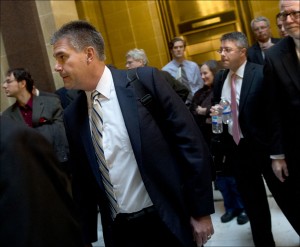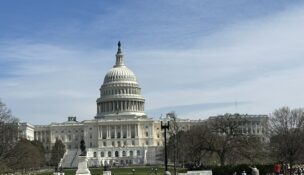Van Hollen on Act 10: ‘We shall win’ (PHOTO SLIDESHOW)
By: Dan Shaw, [email protected]//November 11, 2013//
Van Hollen on Act 10: ‘We shall win’ (PHOTO SLIDESHOW)
By: Dan Shaw, [email protected]//November 11, 2013//

Arguing that the law penalizes those who exercise their constitutional right of association, Madison lawyer Lester Pines argued Monday that Wisconsin’s Supreme Court should strike down the state’s controversial collective bargaining legislation.
Pines, of Cullen Weston Pines & Bach LLP, went head-to-head with state Attorney General J.B. Van Hollen during Monday’s oral arguments in Madison Teachers Inc. v. Scott Walker, which raises questions about the constitutionality of the legislation, commonly known as Act 10.
During his chance before the state justices, Van Hollen argued that Act 10 in no way impedes public employees’ right to associate with each other in organizations such as unions and does not prevent individual workers from petitioning their bosses for raises or benefits. The main effect of the law, he said, was to end the government’s legal requirement to sit across the bargaining table from represented employees and negotiate over a host of issues related to their employment.
“All of them would have the first amendment right to go to their employer,” Van Hollen said. “The employer may or may not listen.”
During the four-hour hearing, Justice Ann Walsh Bradley said the two sides arguing the case were like ships passing in the night. Van Hollen answered by saying it would more apt to describe the ships as being on a collision course.
“But the state’s ship is bigger,” he said. “And we shall win.”
Pines countered by saying, “The Titantic was a big ship too.”
“The one problem for the Titanic,” he added, “was that it ran into an iceberg that was a lot smaller than it was, and it ripped the ship apart and it sank. Well, what Act 10 has run into is the Wisconsin constitution.”
After the hearing, Pines scoffed at the notion that individual petitions ever could lead to substantial wage increases. Arguing before the justices, he conceded that because public employees had first gained collective-bargaining rights through the acts of lawmakers, and not the constitution, the Legislature was free to repeal those rights.
Where the Republican lawmakers who approved Act 10 erred, Pines said, was in making the law punitive to employees who voluntarily chose to enter collective bargaining units after lawmakers had allowed them to do so. To support his assertion, he cited a provision that prevents the state or local governments from having to bargain with employees in collective bargaining units over anything except raises that are indexed to inflation.
If such negotiations lead to an agreement for a greater pay increase, employees will only receive the raise if it is approved by voters in a referendum.
“All that spells you are never going to get a wage increase,” Pines said. “That is a penalty for the employees who are in collective bargaining.”
Pines said Act 10, rather than being the money-saving law proponents claim, really is meant to give public workers an incentive to leave unions.
“This is not a benign provision,” he said. “This is designed to make it impossible to participate in the collective bargaining right for people who have continued to exercise it.”
Aside from the constitutional questions, the justices spent much of their time Monday asking questions about a request to stay a contempt order Dane County Circuit Judge Juan Colas issued against a couple of state employees. Colas ruled in October that two commissioners for the Wisconsin Employment Relations Commission, which oversees various matters concerning employee and management ties, had been disregarding his 2012 ruling finding parts of Act 10 unconstitutional.

Specifically, Colas found that the commissioners, James Scott and Rodney Pasch, were preparing to hold recertification elections for school employee unions in compliance with parts of the law he had struck down. Under Act 10, only a union that is recertified through that process can force an employer to the bargaining table.
In seeking the stay of Colas’ contempt order, Van Hollen’s office had suggested the school union elections could not take place if the request were not granted by Nov. 4. That deadline led several of the justices to question Monday if there was any point in granting the stay now that the date has passed.
Kevin St. John, deputy attorney general for the state, said the Nov. 4 deadline was set in response to an Act 10 provision requiring that the school union elections take place by Dec. 1. Organizing the electoral contests, he said, often takes about 20 days.
But because the current postponement resulted from a court order, rather than the failure of state employees to do their duty, an exception could be granted to the law and the elections could take place at a later date, he said. St. John also said the Colas’ order could affect the union recertification elections that city, county and village employees are to take part in by May 1.
But Chief Justice Shirley Abrahamson questioned if the court would be infringing on the Legislature if the school union elections were allowed to take place after the Dec. 1 statutory deadline.
To win such a recertification election, a union has to hit a high target: winning 51 percent of the vote of potential members, regardless of how many people actually cast ballots. Pines said that is another part of Act 10 that clearly shows the law was meant solely to snatch power away from public employee unions.
“The state has essentially made a decision that it will use the collective bargaining law to so cumulatively burden you,” he said, “to say, ‘Do what you can do, but you will be penalized.’”
Monday marked the second time a suit stemming from Act 10 has gone before the state Supreme Court. Shortly after the law was passed, opponents questioned whether the state Senate had voted on it in way that violated the Legislature’s open-meetings rule. In that instance, the court voted 4-3 that Act 10 had been passed in a legal manner.
An ongoing aspect of the Act 10 debate that Pines and Van Hollen left to other lawyers Monday was questions about whether Wisconsin’s high court should stay a contempt order that a Dane County Circuit judge issued after finding state employees were enforcing parts of Act 10 in disregard of one of his previous judgments.
The justices’ decision on the constitutionality of Act 10 is expected by the end of the 2013-14 term, which wraps up in June.
Legal News
- Net neutrality restored as FCC votes to regulate internet providers
- Wisconsin Attorney General asks Congress to expand reproductive health services
- Attorney General Kaul releases update at three-year anniversary of clergy and faith leader abuse initiative
- State Bar leaders remain deeply divided over special purpose trust
- Former Wisconsin college chancellor fired over porn career is fighting to keep his faculty post
- Pecker says he pledged to be Trump campaign’s ‘eyes and ears’ during 2016 race
- A conservative quest to limit diversity programs gains momentum in states
- Wisconsin prison inmate pleads not guilty to killing cellmate
- Waukesha man sentenced to 30 years for Sex Trafficking
- 12-year-old shot in Milwaukee Wednesday with ‘serious injuries’
- Milwaukee man convicted of laundering proceeds of business email compromise fraud schemes
- Giuliani, Meadows among 18 indicted in Arizona fake electors case
WLJ People
- Power 30 Personal Injury Attorneys – Russell Nicolet
- Power 30 Personal Injury Attorneys – Benjamin Nicolet
- Power 30 Personal Injury Attorneys – Dustin T. Woehl
- Power 30 Personal Injury Attorneys – Katherine Metzger
- Power 30 Personal Injury Attorneys – Joseph Ryan
- Power 30 Personal Injury Attorneys – James M. Ryan
- Power 30 Personal Injury Attorneys – Dana Wachs
- Power 30 Personal Injury Attorneys – Mark L. Thomsen
- Power 30 Personal Injury Attorneys – Matthew Lein
- Power 30 Personal Injury Attorneys – Jeffrey A. Pitman
- Power 30 Personal Injury Attorneys – William Pemberton
- Power 30 Personal Injury Attorneys – Howard S. Sicula











